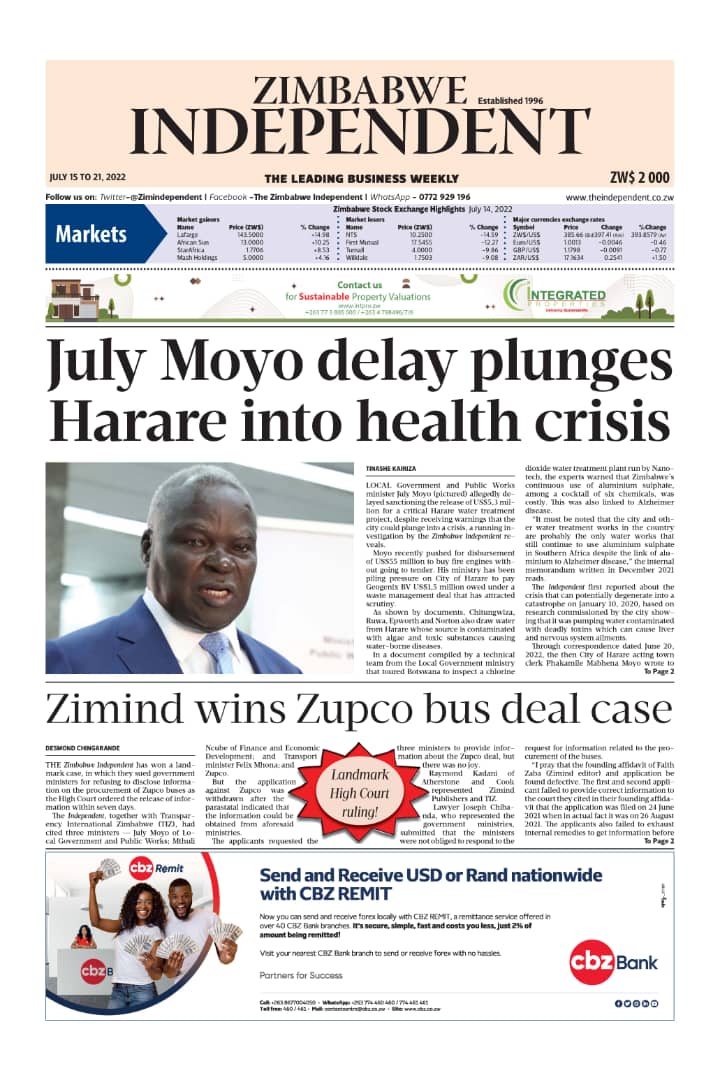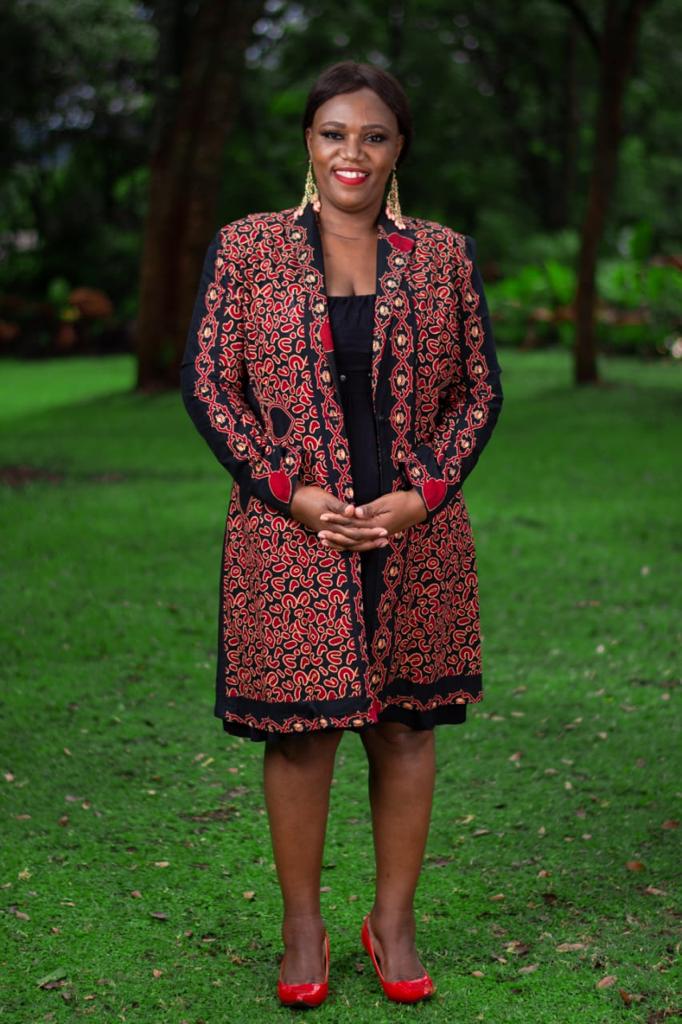
DESMOND CHINGARANDE THE Zimbabwe Independent has won a landmark case, in which they sued government ministers for refusing to disclose information on the procurement of Zupco buses as the High Court ordered the release of information within seven days.
The Independent, together with Transparency International Zimbabwe (TIZ), had cited three ministers — July Moyo of Local Government and Public Works; Mthuli Ncube of Finance and Economic Development; and Transport minister Felix Mhona; and Zupco.
But the application against Zupco was withdrawn after the parastatal indicated that the information could be obtained from aforesaid ministries.
The applicants requested the three ministers to provide information about the Zupco deal, but there was no joy.

Raymond Kadani of Atherstone and Cook represented Zimind Publishers and TIZ.
Lawyer Joseph Chibanda, who represented the government ministries, submitted that the ministers were not obliged to respond to the request for information related to the procurement of the buses.
“I pray that the founding affidavit of Faith Zaba (Zimind editor) and application be found defective. The first and second applicant failed to provide correct information to the court they cited in their founding affidavit that the application was filed on 24 June 2021 when in actual fact it was on 26 August 2021. The applicants also failed to exhaust internal remedies to get information before coming to court,” Chibanda submitted at the time.
- Chamisa under fire over US$120K donation
- Mavhunga puts DeMbare into Chibuku quarterfinals
- Pension funds bet on Cabora Bassa oilfields
- Councils defy govt fire tender directive
Keep Reading

“There was no obligation to answer those requests because they were simply letters to the minister. It is by that reason that it won’t reply to this matter.”
But in his judgment, High Court judge Justice Joseph Mafusire ruled that the Ministry of Local Government and Public Works and that of Finance and Economic Development’s long technical objections were short of facts and the notion that the applicants had been supplied with all the information was wrong.
“The second respondent’s (Finance ministry) opposing affidavit is largely argumentative and long on technical objections and short on facts. But in substance, the ground of opposition on the merits is the same as that of the first respondent (Local Government) namely that the applicants had been supplied with all the information needed or that they were barking up the wrong tree,” Mafusire ruled. “The factual position is clearly one not to detain the court. The respondents have not produced anything to support the claim that they responded to the applicant’s request, even via the press, notwithstanding that this would not be in compliance with the legislation.”
Mafusire ruled that the ministries did not comply with the law as administrative authorities.
They also did not comply with the duty imposed upon them where a request for information, such as was made by the applicant is concerned, according to the judge.
He said by not supplying the information, the ministries should supply their written reasons.
“There can be nothing standing in the way of the very limited relief sought by the applicants save the question of costs which are sought on an attorney and client scale. Nothing has been shown to warrant such a penal order of costs. In the circumstance, the application is granted in terms of the draft order as amended,” Mafusire ruled. “Within seven days of the date of this order, the first and second respondents shall supply the first applicant, through its legal practitioners Atherstone and Cook, with the written reasons for their refusal to provide the information sought by the applicants, Zimind Publishers and Transparency International Zimbabwe, through letters to the respondents dated 3 September 2020, 9 September 2020 and 2 March 2021 pertaining to the procurement of the 64-seater buses consigned to the Zupco.”
The High Court heard that on March 11, 2020, it was reported by The Herald in an article under the heading: 65 more Zupco buses delivered that many buses had been delivered from China to bolster Zupco’s fleet as part of the government’s efforts to provide affordable transport.
In March 2020, the Independent, following a three-month investigation had reported about the suspicious circumstances surrounding the acquisition of buses for the third respondent (Zupco).
The story linked the transaction to a company known as Landela Investments (Pvt) Ltd.
These articles reported that the government had initially signed a hire purchase agreement with Landela Investments but had subsequently decided to pay Landela Investments ZW$863,2 million for 162 buses.
Landela Investments thereafter sold each bus to the government for US$212 962 yet the company had purchased the buses from China for US$58 900.
It was this curious arrangement which prompted the Independent to probe the nature of Landela Investments (Pvt) Ltd and accordingly, they sought to peruse the Registrar of Companies records relating to Landela. But the records relating to that company were reported to be missing by the Companies Registry.
The applicants’ legal practitioners then made follow-up efforts to obtain more information about Landela Investments but the lawyers’ endeavours were in vain.
The applicant’s lawyer, Chris Mhike wrote a letter to the Registrar of Companies dated July 23, 2020, which was never responded to.
Sometime in May 2020, the Independent had asked the first (Moyo), second (Ncube) and fourth respondent (then Transport Minister, the late Joel Biggie Matiza) to shed more light on the details surrounding the purchase of buses and the involvement, if any, of Landela.
Regrettably, this information was not forthcoming as all three Cabinet ministers distanced their respective ministries from the transaction.
When asked to comment, Local Government ministry confirmed that Zupco falls under the jurisdiction of the Transport ministry, but that the procurement of buses is a Central Mechanical Equipment Department (CMED) issue, a parastatal which falls under the same ministry.
The Ministry of Transport and Infrastructure Development then directed questions relating to the purchase of buses to the Ministry of Finance and Economic Development, advising that they were responsible for the relevant tenders and purchases.
The Ministry of Finance and Economic Development declined to take responsibility, saying the ministry only approves payment but was not involved in the purchase of buses. They then shifted responsibility to the Procurement Regulatory Authority of Zimbabwe (Praz).
“When Praz was asked to comment on the Ministry of Finance statement, its position in a letter dated June 4, 2020, was that procurement is the responsibility of the procuring entity and that its role in terms of the applicable laws is that of a regulator and that it does not have a direct role in the approval of tenders,” the applicants submitted.
“The respondents’ evasive attitude only raised greater concerns around the business and financial arrangements relating to the transaction; and on August 26, 2020, the applicants’ legal practitioners wrote to the third (Zupco) and fourth respondents (Transport minister), requesting for information relating to the purchase of buses. The specific questions put to the respondents. The position taken by the fourth respondent in response to the request for information was that Zupco falls under the first respondent’s ministry. His letter dated August 31, 2020.”
On September 3, 2020, a separate request for information letter was addressed to the second respondent; and another was addressed to the first respondent on September 9, 2020 and no information was provided to the applicants by the respondents.
The respondents refused to disclose pertinent information regarding the purchase of buses. The information is within their knowledge and is reasonably accessible to them.
This led to the applicants filing the application.

Media Institute of Southern Africa director Tabani Moyo said: “This is a major development in the struggle for access to information. It is a key milestone towards the enjoyment of the constitutionally provided right”











